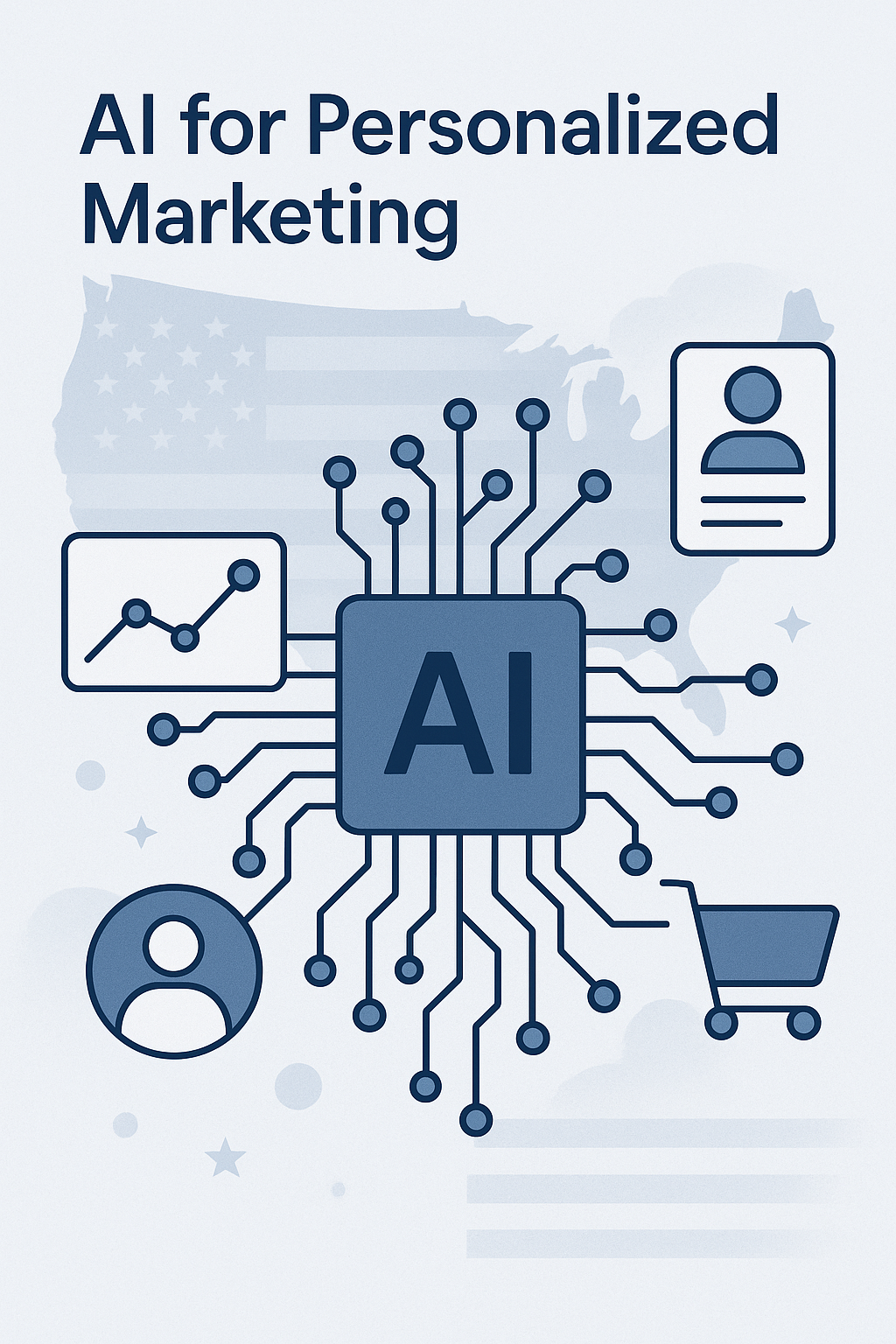
AI for Personalized Marketing: The Ultimate 2025 Guide
In 2025, AI for personalized marketing is transforming how U.S. businesses connect with customers. From tailored email campaigns to dynamic website experiences, artificial intelligence is the driving force behind marketing strategies that feel personal, relevant, and timely. This comprehensive guide explores how AI is revolutionizing personalized marketing, the top tools available, and actionable strategies for success.
What Is AI for Personalized Marketing?
AI for personalized marketing refers to the use of artificial intelligence technologies to deliver individualized content, offers, and experiences to consumers. By analyzing vast amounts of data, AI can predict customer preferences, automate campaign delivery, and optimize interactions across channels.
Key Components of AI-Powered Personalization
- Data Collection & Analysis: AI gathers and interprets customer data from multiple sources.
- Segmentation: AI divides audiences into micro-segments based on behavior and preferences.
- Content Personalization: AI customizes messages, product recommendations, and offers.
- Real-Time Optimization: AI adjusts campaigns instantly based on user interactions.
TIP: 🧠 Leverage AI to uncover hidden patterns in customer data that manual analysis might miss.
Why AI for Personalized Marketing Matters in 2025
Personalization is no longer a luxury—it’s an expectation. According to the latest U.S. data, 80% of consumers are more likely to purchase from brands that offer personalized experiences. AI enables marketers to meet these expectations at scale, driving higher engagement, loyalty, and revenue.
Benefits of AI-Driven Personalization
- 📈 Increased Conversion Rates: Tailored experiences lead to more sales.
- ⏱️ Time Savings: Automation frees up marketers for strategic tasks.
- 🤝 Stronger Customer Relationships: Personalization builds trust and loyalty.
- 💰 Higher ROI: Efficient targeting reduces wasted ad spend.
Top 10 AI Tools for Personalized Marketing in 2025
Choosing the right AI tool is crucial for maximizing your personalized marketing efforts. Here are the top 10 AI platforms leading the U.S. market in 2025:
- Salesforce Einstein
- Adobe Sensei
- HubSpot AI
- Dynamic Yield
- Emarsys
- Persado
- Blueshift
- Optimove
- Iterable
- Mailchimp AI
Side-by-Side Comparison Table
| Rank | AI Tool | Best For | Key Feature | Pricing Tier |
|---|---|---|---|---|
| 1 | Salesforce Einstein | Enterprise CRM Integration | Predictive Analytics | $$$$ |
| 2 | Adobe Sensei | Omnichannel Experiences | Content Personalization | $$$$ |
| 3 | HubSpot AI | Inbound Marketing | Automated Workflows | $$$ |
| 4 | Dynamic Yield | E-commerce Personalization | Real-Time Recommendations | $$$ |
| 5 | Emarsys | Retail & E-commerce | Cross-Channel Automation | $$$ |
| 6 | Persado | Copy Optimization | AI-Generated Messaging | $$$ |
| 7 | Blueshift | Customer Data Platforms | Predictive Segmentation | $$$ |
| 8 | Optimove | Retention Marketing | Multichannel Orchestration | $$$ |
| 9 | Iterable | Growth Marketing | Journey Automation | $$ |
| 10 | Mailchimp AI | Small Business Email | Smart Recommendations | $ |
TIP: 📦 Start with a tool that integrates seamlessly with your existing marketing stack for faster implementation.
How AI for Personalized Marketing Works: Real-World Examples
1. AI-Powered Email Campaigns
AI analyzes user behavior to send emails at optimal times with content tailored to each recipient.
if (user.last_purchase > 30 days) {
send_email("We Miss You! Here's 15% Off Your Next Order");
} else {
send_email("Recommended for You: " + personalized_product_list);
}
2. Dynamic Website Personalization
Websites powered by AI display different content, products, or offers based on visitor profiles.
if (user.location == "California") {
show_banner("Free Shipping in California!");
} else {
show_banner("Check Out Our Nationwide Deals!");
}
3. AI Chatbots for Personalized Support
AI chatbots provide instant, tailored responses to customer inquiries, improving satisfaction and conversion rates.
User: "I'm looking for running shoes."
Bot: "Great! Based on your past purchases, you might like our new lightweight trainers."
Best Practices for Implementing AI in Personalized Marketing
1. Start with Clean, Comprehensive Data
AI is only as good as the data it uses. Ensure your customer data is accurate, up-to-date, and unified across platforms.
2. Define Clear Personalization Goals
Set measurable objectives, such as increasing email open rates by 20% or boosting repeat purchases.
3. Test, Learn, and Optimize
Use A/B testing and analytics to refine your AI-driven campaigns continuously.
4. Prioritize Privacy and Transparency
With evolving U.S. privacy regulations, be transparent about data usage and give customers control over their information.
TIP: ✅ Always provide easy opt-out options and clear privacy policies to build trust.
Challenges and Solutions in AI for Personalized Marketing
Common Challenges
- 🏥 Data Silos: Fragmented data limits AI effectiveness.
- 🔒 Privacy Concerns: Stricter regulations require careful data handling.
- 🤖 Over-Automation: Too much automation can feel impersonal.
Solutions
- Integrate data sources for a unified customer view.
- Stay updated on U.S. privacy laws and adapt accordingly.
- Balance automation with human touchpoints for authenticity.
The Future of AI for Personalized Marketing in the U.S.
Looking ahead, AI will continue to evolve, offering even deeper personalization through:
- Predictive Customer Journeys: Anticipating needs before customers express them.
- Hyper-Personalized Content: Real-time adaptation of messaging, visuals, and offers.
- Voice and Visual AI: Personalization across new channels like smart speakers and AR.
TIP: 🚀 Stay ahead by investing in AI training for your marketing team and experimenting with emerging technologies.
Conclusion
AI for personalized marketing is reshaping the U.S. marketing landscape in 2025. By leveraging advanced AI tools, businesses can deliver highly relevant experiences that drive engagement, loyalty, and revenue. The key to success lies in choosing the right platforms, maintaining high-quality data, and balancing automation with a human touch. As AI technology continues to advance, marketers who embrace these innovations will be best positioned to meet—and exceed—customer expectations in the years ahead.